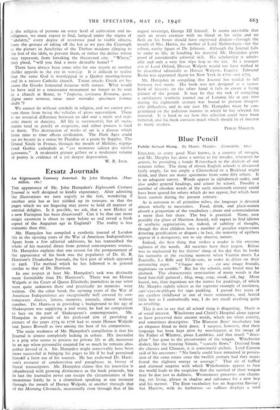Ersatz Journals
An Eighteenth Century Journal. By John Hampden. (Mac- millan. t6s.)
THE appearance of Mr. John Hampden's Eighteenth Century 7ourrial is well designed to kindle expectancy. After admiring the illustrations we turn eagerly to the text, wondering if another attic has at last yielded up its treasure, so that the pages which we are fingering may prove to hold all manner of untried delights. Is it possible, we ask, that a new Hickey or a new Farington has been discovered? Can it be that one more magic casement is about to open before us and reveal a fresh aspect of the Auggstan age in England? The reality is less romantic than this.
Mr. Hampden has compiled a synthetic journal of London life in the opening years of the War of American Independence. Apart from a few editorial additions, he has transcribed the whole of his material direct from printed contemporary sources. Mr. Hampden explains that one reason for the postponement of the appearance of his book was the popularity of Dr. G. B. Harrison's Elizabethan Yournals, the first part of which appeared in 1928. The method which he has followed is in general similar to that of Dr. Harrison.
In one respect at least Mr. Hampden's task was distinctly more formidable than Dr. Harrison's. There was no Horace Walpole at the Court of Queen Elizabeth; journalists in our sense were quite unknown there and practically no memoirs were written. On the other hand, the opening years of the War of American Independence are exceptionally well covered by con- temporary diaries, letters, memoirs, journals, almost without number. Dr. Harrison in providing a background to the age of Shakespeare was supplying a real want; he had no competition to face on the part of Shakespeare's contemporaries. Mr. Hampden in pursuit of his professed aim of providing a picture of the years 1774 to 1776 had to count Horace Walpole and James Boswell as two among the host of his competitors.
The main weakness of Mr. Hampden's compilation is that his Journal is almost completely lacking in colour. His journalist is a prig who seems to possess no private life at all; moreover in an age when personality counted for so much he remains alto- gether devoid of it. Mr. Hampden might conceivably have been more successful in bringing his pages to life if he had permitted himself a freer use of his sources. He has eschewed Dr. Harri- son's resource of condensation and paraphrase in favour of literal transcription. Mr. Hampden claims that his journalist is adumbrated with growing distinctness as the book proceeds, but in fact the journalist never can escape the circumstances of his monstrous birth; he is a chameleon speaking at one moment through the mouth of Horace Walpole, at another through that of the Morning Chronicle, occasionally even through that of his august sovereign, George III himself. It seems inevitable that such an ersatz creature with no blood in his veins and no flesh on his bones should have expressed disdain—through the mouth of Mrs. Harris, the mother of Lord Malmesbury—for the robust, earthy figure of Dr. Johnson. Although the Journal fails to come to life, in handling his material Mr. Hampden gives proof of considerable editorial skill. His scholarship is admir- able and only a very few slips leap to the eye. As a younger son of Lord Orford, Horace Walpole would not have wished to be described editorially as Horace Walpole, Esquire. Edmund Burke was appointed Agent for New York in 177o—not 1775.
Mr. Hampden in compiling this Journal has tended to fall between two stools. His book was not designed as a source book of history; on the other hand it fails to create a living picture of the period. It may be that the task of compiling a satisfactory synthetic journal out of London life at any time during the eighteenth century was bound to present insuper- able difficulties, and in any case Mr. Hampden must be con- gratulated on the judicious manner in which he has selected his material. It is hard to see how this selection could have been bettered, and his book contains much which should be of interest to many readers.
PHILIP MAGNUS.






























 Previous page
Previous page